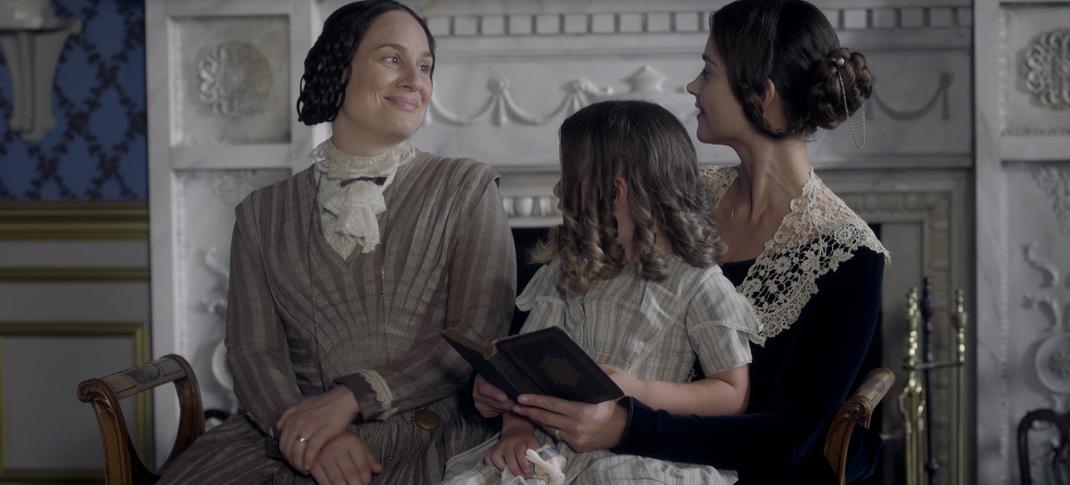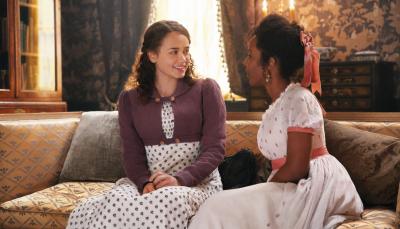Know Your 'Victoria' History: "The Luxury of Conscience"

Victoria, Season 2 MASTERPIECE on PBS Episode Six - "The Luxury of Conscience" Sunday, February 18, 2018 at 9pm ET Victoria and Albert have to face their worst nightmare as parents, while Peel takes on the ultimate battle in Parliament. When tragedy strikes, they must confront the true cost of standing by your convictions. Shown from left to right: Daniela Holtz as Lehzen and Jenna Coleman as Victoria For editorial use only. ©ITVStudios2017 for MASTERPIECE
Think you know the history of Queen Victoria's reign? Wondering how much of the history portrayed by PBS series Victoria is accurate? We run down the truth behind the drama in the latest episode of Season 2, "The Luxury of Conscience."
Did Lehzen Really Get Vicky Sick?
Baroness Lezhen has been a fixture on the series since the first episode. As a character, the show has been faithful to who she was in real life: a pastor's daughter who by chance and luck got herself a governess position in the Duke of Kent's household. When fate put him in line for the throne, and Victoria as his only heir, Lezhen became the confidante and best friend to a future queen who spent her days locked away from society. Lezhen was indeed the one who pushed Victoria to refuse to listen to her mother and John Conroy once she ascended the throne, and functioned as her personal secretary until her marriage to Albert and the birth of her children.
But Baroness Lezhen was also an old-fashioned woman. And she and Albert were jealous of the other from the outset of Victoria's marriage. (Lezhen wanted Victoria to never marry and be a "virgin queen" like Elizabeth I before her.) And when little Vicky got sick in 1842*, Albert used it against her.
What the show leaves out is that the Baroness did hire a Doctor prior to the Princess Royal's parents freaking out, who insisted that Vicky was perfectly fine, and prescribed "fresh air" which is how the child got so ill so quickly. This explains the Baroness' confidence the child was fine. After all, the Doctor said she was. But it was the mistake that cost her the war against Albert. Lezhen was sent back to Hanover, where she lived out her life as a devotee to her queen. (Victoria did visit her privately a few times later on so we can hope actress Daniela Holtz gets a cameo in future seasons.)

Did Drummond Really Get Shot?
The heart of this week's episode lies in the story of Lord Alfred and Drummond, and Drummond dying, because burying your gays is a cliché. There is, by the way, no evidence that Drummond and Lord Alfred ever had an affair. But it seems unlikely. First off, Drummond wasn't young and handsome, nor was he in the middle of getting married. He was 50 in 1842. On the other hand, Lord Alfred was in his mid-20 when he started working in the Palace for the Queen, but that wasn't until three years after Drummond's death. The chance of them meeting and falling in love? Almost zero.
But Drummond's death really did occur via an assassin's bullet meant for Peel. It just didn't happen quite the way Victoria claims. There was an assassination attempt, but it wasn't a farmer who thought the Corn Laws repeal would ruin him. That's because the attempt didn't happen in conjunction with the repeal, it actually happened three years earlier in 1843.*
The man who attempted to kill Peel was one Daniel M'Naghten, a Scotsman who today would probably be diagnosed with paranoid schizophrenia. He stalked Peel and his entourage for days before the attempt. The problem was, he actually never figured out which one was Peel. He guessed, and he guessed wrong, shooting Drummond as he left Peel's house after a meeting. This was the first case ever to be defended by reason of insanity since his claim to why he was trying to kill Peel included things like "The Tories in my native city have compelled me to do this. They follow, persecute me wherever I go, and have entirely destroyed my peace of mind." He was found not guilty, much to the Queen's displeasure.
The real Drummond didn't die right away. In fact, he stood up and walked away from the scene after being shot. It was the medical "experts" trying to remove the bullet from his abdomen, and their leeches, that caused the infection that did him in.
Did Peel Really Lose His Prime Minister Position Over The Corn Laws?
We've been talking about the Corn Laws all season on and off. As the show explained earlier in the season, they were laws supported by the House of Lords "restricting the amount of foreign grain that could come into the country, protecting the profits of landowners and British farmers by artificially pushing up the price of bread." They were also responsible for the Irish Famine, as those who could not afford bread lived on the potato crops, which then failed.
There was an Anti-Corn Law league that was started before Victoria's reign, back in 1838. The repeal was supported for years by the industrialists (the Whigs) and those who represented the poor (the Liberals). The Conservative Tories, who were then as now, the party of the rich, were all for the laws to continue.
Peel was a Tory Prime Minister, but from the beginning of his reign, the Anti-Corn Law league was on him to repeal them as inhumane. For a long time, Peel refused to listen, as his own personal opinions were outweighed by the majority of his party, and he needed to support them to stay in power. But the Irish Famine in 1845 changed his heart and his mind. The moment he announced he would support repeal, it was a ticking clock on a vote of "no confidence from his own party." At first, it seemed even though Peel wanted to repeal the laws, he didn't have the votes. But finally, a majority-minority coalition came together with a small group of "Peelists" joining him, the Whigs and the Liberals for repeal in 1846*.
The laws were rolled back, but the damage was done. The conservative party split in two, even as Peel resigned his position.

A Note About The Timeline
You may have noticed I put a star by the year each of these things occurred. All three stories this week happened in completely different years. Lezhen's firing was in 1842, Drummond's death in 1843 and Peel's repeal in 1846. While the first and third stories are accurate in their own way, on the whole, the show is playing fast and loose with the historical timeline to have everything wrapped up nicely before the Christmas special next week.




